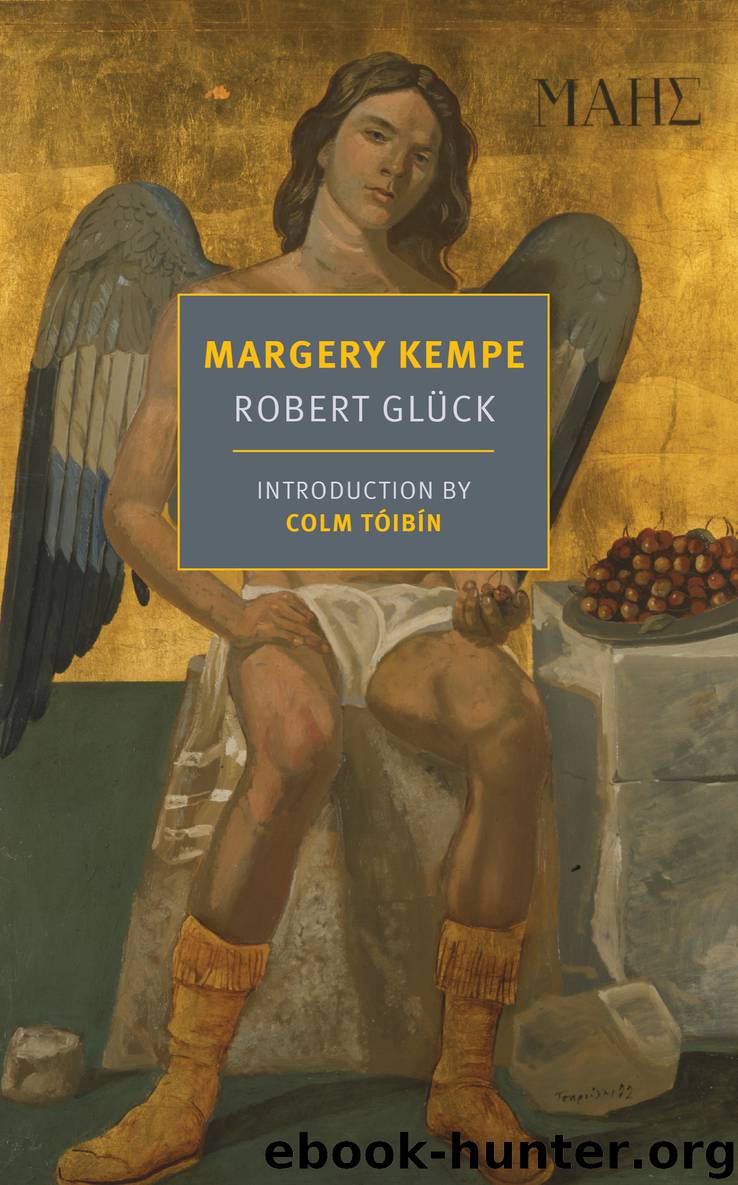Margery Kempe by Robert Gluck

Author:Robert Gluck
Language: eng
Format: epub
Publisher: New York Review Books
Published: 2020-03-09T16:00:00+00:00
26
Jesus and Mary squatted, making little cries, then looked curiously at each other’s shit.
Later they sat on a marble bench in the yard outside St. John Lateran. Mary wore a white mantle and robe. The English priest grabbed her white collar. “You wolf, what is this cloth you wear?”
Mary looked happily into his face. Swifts gliding by on stiff wings shrieked, “Wool, sir.”
“Now I know you have a devil because I hear him speak.”
“Ah, good sir,” she laughed, “drive him away, drive him away.” Her laughter touched an exposed nerve; the priest lurched back and retreated in confusion.
A light drizzle darkened the flagstones except for a dry gray rectangle under their bench. Contorted roots of umbrella pines had gripped and dislodged some of the stones. Jesus could not define himself through Mary. She caressed the folds of his mantle as though they were membranes. She whispered, “I see pale angels round about you.” She felt the thick surge that lifts us towards a person we love. He looked up. The angels were primitive, like golden orchids.
Jesus felt muddled, a fog of sadness closing in. He depended on Margery for motivation but a cold bar plunged through his heart when she asked, Did you miss me? Their time together was more definitive for him since he had much more to define. Their sex was satisfying but he was undermined by the terror of the incomplete: If her cheekbones were higher or personality cooler would their union be more compelling? Safety meant being recognized without returning recognition. That is, everyone was his slave. As though to confirm this, Jesus asked his own mother to beg for Margery’s food and wine.
•
So that night Mary went to a feast with important people—she was disguised but visible. It was not unusual for these banquets to include a pauper who was holy, even divine. She sat at the high table next to Wenslawe, the priest from St. John Lateran. He was like a child, wide eyed with surprise. He ate with his head lowered, then pressed a gold coin in her palm and whispered, “If I have to die, return me as a stylish woman’s elaborate earring.”
•
I feel close to Wenslawe and I make Jesus into my own god whose beauty is a lens—intenser light, clearer colors—like sight in heaven. Absolute Good is casting shadows, and when I pull out I am awed that he is stretched wide open and I catch a whiff as sweetly fetid and timeless as any New York sewer.
When I began Margery, I took Flaubert’s “The Legend of St. Julian Hospitaler” as a model, a moral and supernatural tale by a writer whose entire faith was in writing, as though telling a story perfectly were the same as obtaining forgiveness for existing. I am drawn to modernism but my faith is impure. I am no more the solitary author of this book than I alone invent the fiction of my life. As I write, I read my experience as well as Margery’s.
Download
This site does not store any files on its server. We only index and link to content provided by other sites. Please contact the content providers to delete copyright contents if any and email us, we'll remove relevant links or contents immediately.
The Art of Boudoir Photography: How to Create Stunning Photographs of Women by Christa Meola(18629)
Red Sparrow by Jason Matthews(5476)
Harry Potter 02 & The Chamber Of Secrets (Illustrated) by J.K. Rowling(3677)
In a Sunburned Country by Bill Bryson(3543)
Drawing Cutting Edge Anatomy by Christopher Hart(3529)
Figure Drawing for Artists by Steve Huston(3452)
Harry Potter and the Prisoner of Azkaban (Book 3) by J. K. Rowling(3360)
The Daily Stoic by Holiday Ryan & Hanselman Stephen(3325)
Japanese Design by Patricia J. Graham(3178)
The Roots of Romanticism (Second Edition) by Berlin Isaiah Hardy Henry Gray John(2918)
Make Comics Like the Pros by Greg Pak(2918)
Stacked Decks by The Rotenberg Collection(2883)
Harry Potter and the Deathly Hallows (7) by J.K. Rowling(2726)
Draw-A-Saurus by James Silvani(2719)
Tattoo Art by Doralba Picerno(2670)
On Photography by Susan Sontag(2640)
Churchill by Paul Johnson(2587)
The Daily Stoic by Ryan Holiday & Stephen Hanselman(2579)
Drawing and Painting Birds by Tim Wootton(2512)
